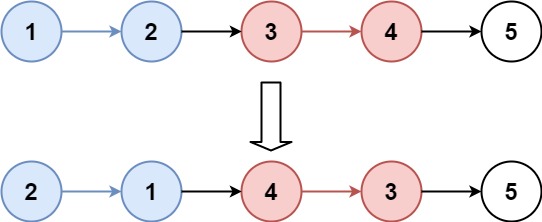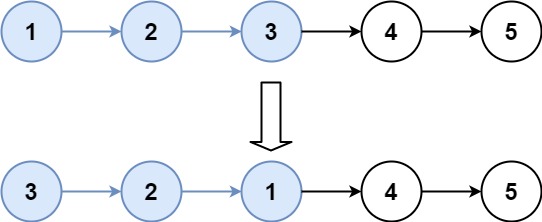LeetCode-in-All
25. Reverse Nodes in k-Group
Hard
Given a linked list, reverse the nodes of a linked list k at a time and return its modified list.
k is a positive integer and is less than or equal to the length of the linked list. If the number of nodes is not a multiple of k then left-out nodes, in the end, should remain as it is.
You may not alter the values in the list’s nodes, only nodes themselves may be changed.
Example 1:

Input: head = [1,2,3,4,5], k = 2
Output: [2,1,4,3,5]
Example 2:

Input: head = [1,2,3,4,5], k = 3
Output: [3,2,1,4,5]
Example 3:
Input: head = [1,2,3,4,5], k = 1
Output: [1,2,3,4,5]
Example 4:
Input: head = [1], k = 1
Output: [1]
Constraints:
- The number of nodes in the list is in the range
sz. 1 <= sz <= 50000 <= Node.val <= 10001 <= k <= sz
Follow-up: Can you solve the problem in O(1) extra memory space?
Solution
/**
* Definition for singly-linked list.
* class ListNode {
* int val;
* ListNode? next;
* ListNode([this.val = 0, this.next]);
* }
*/
class Solution {
ListNode? reverseKGroup(ListNode? head, int k) {
if (head == null || head.next == null || k == 1) {
return head;
}
int j = 0;
ListNode? len = head;
// Check if the linked list has fewer than `k` nodes, return the list as is.
while (j < k) {
if (len == null) {
return head;
}
len = len.next;
j++;
}
// Reverse `k` nodes.
ListNode? current = head;
ListNode? next;
ListNode? prev = null;
int i = 0;
// Traverse and reverse the nodes in groups of `k`.
while (i < k) {
next = current!.next;
current.next = prev;
prev = current;
current = next;
i++;
}
// Recursively reverse the next `k` group of nodes.
head!.next = reverseKGroup(current, k);
// Return the new head of the reversed list.
return prev;
}
}

